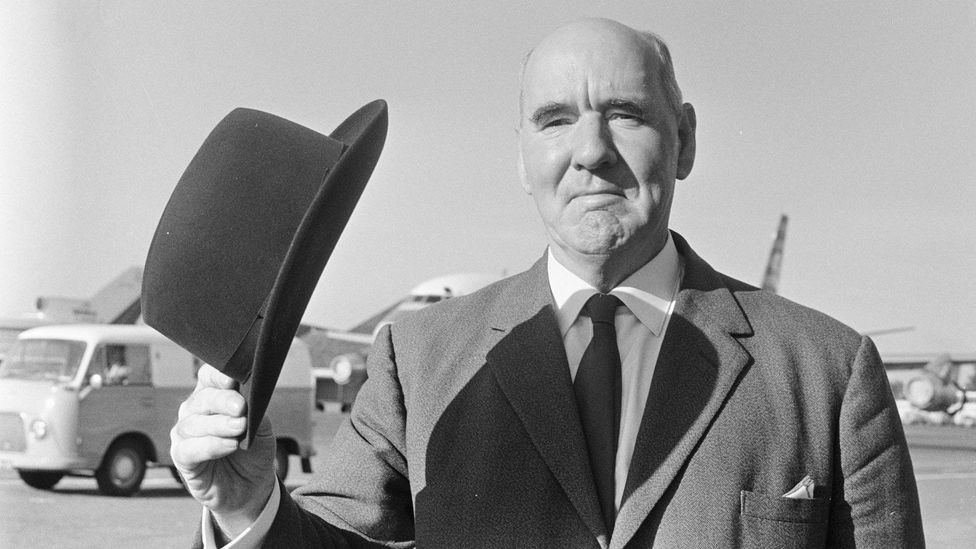Can You Get Big Law by Who You Know
The 'constabulary' that explains why you can't get anything washed

A British historian famously wrote that work expands to fill bachelor time – but what was he actually saying nearly inefficiency?
W
With offices closed in nations effectually the world, many of us are grappling with how to stay productive and on chore as we work from habitation. To assistance provide insight on how to manage this, BBC Worklife is updating some of our virtually pop productivity stories from our archive. This article was first published on 8 November 2019.
"It is a commonplace ascertainment that work expands so as to fill the time available for its completion." British naval historian and author Cyril Northcote Parkinson wrote that opening line for an essay in The Economist in 1955, but the concept known as 'Parkinson'southward Law' still lives on today.
I recollect nearly information technology every time I have a deadline. How long information technology takes me to write a story will by and large depend on when my borderline is and how much time I accept until then. In his somewhat satirical essay Parkinson uses the instance of an elderly lady writing a postcard to her niece. Since she has nothing else to exercise with her fourth dimension, the otherwise elementary task takes upwardly her entire day.
Patently, I'1000 non the just ane for whom the notion rings true. 'Parkinson's Constabulary' took on a life of its own, forming the basis of several more than essays and a book by Parkinson, leading to public lectures around the world.
Just what fewer people know is that Parkinson's original intent was non to take aim at old lady alphabetic character-writers or journalists similar me, only at a different kind of inefficiency – the bureaucratisation of the British Ceremonious Service. In his original essay he pointed out that although the number of navy ships decreased by two thirds, and personnel past a third, between 1914 and 1928, the number of bureaucrats had still ballooned by almost 6% a twelvemonth. At that place were fewer people and less work to manage – but management was all the same expanding, and Parkinson argued that this was due to factors that were independent of naval operational needs.

Cyril Northcote Parkinson is the originator of Parkinson's Law (Credit: Alamy)
Go more subordinates, create more work
One scholar who has taken a serious look at Parkinson's Law is Stefan Thurner, a professor in Science of Complex Systems at the Medical University of Vienna. Thurner says he became interested in the concept when the faculty of medicine at the University of Vienna split into its own independent university in 2004. Within a couple years, he says, the Medical University of Vienna went from existence run by 15 people to 100, while the number of scientists stayed about the same. "I wanted to understand what was going on at that place, and why my bureaucratic brunt did non diminish – on the contrary it increased," he says.
He happened to read Parkinson's book effectually the aforementioned time and was inspired to plough it into a mathematical model that could be manipulated and tested, along with co-authors Peter Klimek and Rudolf Hanel. "Parkinson argued that if you accept 6% growth rate of any administrative body, then sooner or after any company volition die. They will have all their workforce in bureaucracy and none in production."
Parkinson pointed to ii critical elements that lead to bureaucratisation – what he called the law of multiplication of subordinates, the tendency of managers to hire two or more subordinates to study to them so that neither is in direct competition with the manager themself; and the fact that bureaucrats create work for other bureaucrats.
Thurner says that companies typically start with a flat hierarchy, mayhap two engineers. As the company grows, they hire assistants, who then get promoted and hire their ain subordinates. "A pyramid starts to grow. One might add artificial layers that serve no purpose other than introducing hierarchy, that help you to promote people to please them and keep them motivated. When the pyramid gets very large and expensive it might eat up all the company's profits. If the bureaucratic torso is not drastically reduced at this stage the company volition die."

The bigger the size of a regime or organization, the more bureaucracy – and, in turn, the less effective information technology is (Credit: Alamy)
Thurner as well looked at inefficiencies in Parkinson's original context: governments. In another written report, he and his colleagues examined cabinet sizes of near 200 countries. They constitute that cabinet size was negatively correlated with government effectiveness; political stability; vocalisation and accountability as measured by the Globe Bank; and life expectancy, knowledge and standard of living equally measured past the Un.
To test how the size of a group affects its ability to make decisions, they created a model based on data menstruum networks and found that a significant change occurred when groups hit twenty. "Nosotros found a realistic linking pattern of people and gave artificial committees random initial opinions on subjects," he says. "At 20 y'all see a strong divergence in coalition building. Smaller groups form and they block each other, which explains why it is exceedingly hard to come upwardly with unanimous decisions when cabinets are big."
Can 'menacing' deadlines cure dallying?
So if the wider points Parkinson was making about bureaucracies still stand upwards today, what of his enduring first line? Today, while some researchers might chuckle at the mention of the 'police force' that has come to hateful then much more than its original intent, at that place's also no dubiety they know what it is referring to. Is there some truth to the notion that without strict time constraints, we waste product fourth dimension and our work takes longer to complete?
In fact, studies in the decades since Parkinson wrote his essay have shown information technology has some merit. In the 1960s, researchers showed that when subjects were "accidentally" given extra time to complete a task, the task took longer to consummate. In another set of studies from 1999, subjects were asked to evaluate four sets of photos. When they were told the fourth set was cancelled, they spent more fourth dimension "dallying" on the 3rd, rather than merely finishing the chore more quickly. Researchers also institute that the extra time spent on a task – in this case counting the number of letters in a phrase – didn't atomic number 82 to increased accuracy or power to call up word pairs on a surprise test afterwards.
So does this mean that as a author, I should be setting my deadlines earlier or limiting the work I do on each story? In general, should we be imposing tougher time constraints to amend our productivity?

"Because our attentional capacity is limited, nosotros split up it sporadically any way we can equally nosotros run through everyday life," says Eldar Shafir (Credit: Alamy)
Humans take a limited capacity for memory, attention and fatigue – or mental bandwidth, co-ordinate to Eldar Shafir, a professor at Princeton and co-writer of Scarcity, a volume that looks at the psychology of having less than we demand and how it drives our behaviours. "Considering our attentional capacity is limited, we divide it sporadically any mode we can equally nosotros run through everyday life," he says. But sometimes, of necessity, we need to knuckle down.
In his book, he and co-author Sendhil Mullainathan talk about focusing securely on a project at the cost of other things. "When you have a deadline it's like a storm ahead of yous or having a truck around the corner. Information technology's menacing and it's budgeted, then you focus heavily on the job." And yous may well pull off a bang-up job, but the problem is that everything else gets moved to the periphery. "If you're focusing and so heavily on a big project you may at the same time forget to pick up your child from school, your mom'south altogether, to feed the domestic dog etc. That may be the cost you pay for the success you're achieving with your focus."
And there's e'er the gamble that rushing to accomplish something in too few hours can have drawbacks besides, specially if your borderline is set by somebody else. "If your deadline is too short and y'all're panicking, you will accept sacrificed other things and you might work inefficiently, and things might become badly anyway," he says.
"People like to say if it wasn't for the terminal minute, cipher would get done. But enquiry shows people'south productivity is not linear," says Elizabeth Tenney, an banana professor at the University of Utah's Eccles School of Business who has written nigh time force per unit area and productivity. "When people sit to practice a task, they'll put in a lot of effort initially. At some point at that place'south going to exist diminishing returns on extra effort. To optimise productivity, you need to maximise benefits and minimise costs and detect that inflection point, which is where yous should start to wrap up."
That might non mean taking upwardly the full fourth dimension allotted or working all the way up to your borderline, she says. "Cut yourself off rather than keep tinkering for all time."
So what about Parkinson'south hypothetical little old lady writing letters? If she had given herself a tighter deadline, she would've probably finished more speedily. But with nothing else to do all day, she finished just in fourth dimension.
Source: https://www.bbc.com/worklife/article/20191107-the-law-that-explains-why-you-cant-get-anything-done
ارسال یک نظر for "Can You Get Big Law by Who You Know"